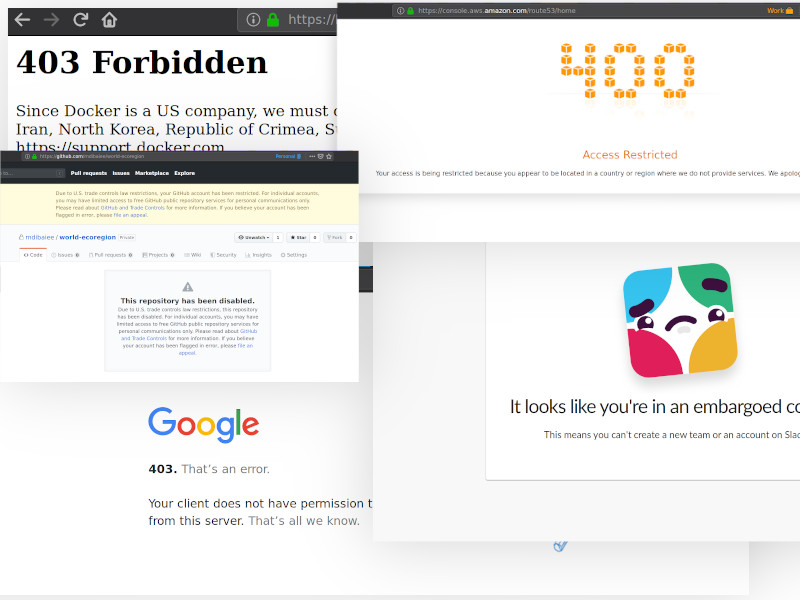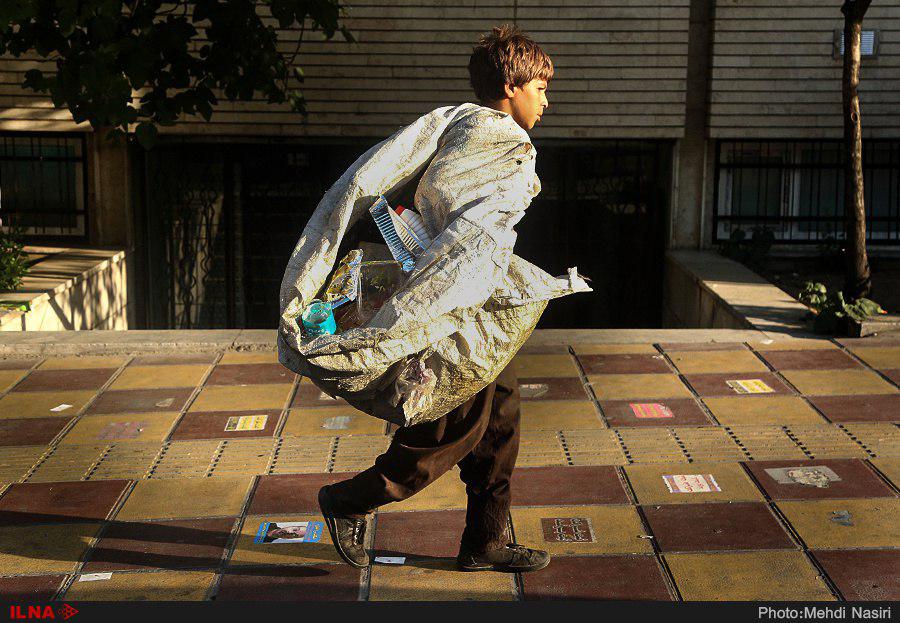# Iran Sanctions: A Story of Discrimination and Isolation
Let me take you through a story on what it feels like to be isolated from the
world, not by choice, but rather, by force. This is a story of discrimination,
of monopoly, of people shrugging to these issues and of utterances that affect
lives of millions.
Living in Iran, or any sanctioned country for that matter, you learn to read
"anyone, anywhere" with an appendix of "except you". You soon learn "worldwide
shipping" excludes you, that's when you start wondering, are you not living in
"the world"? Where is this "world" they talk about?
Here is an example of a beautiful, hopeful message from Khan Academy:

{% include caption.html text='"We’re a nonprofit with the mission to provide a free, world-class education for anyone, anywhere."' %}
No one probably realizes that this is not true, but yes, Khan Academy is not
available to Iranians, Cubans, Syrians, people of Crimea, and some others.
That's because [they run on Google
Cloud](https://cloud.google.com/customers/khan-academy/), an infrastructure
provider that completely blocks all sanctioned countries from accessing any
application hosted on it. Who else hosts their service there? Take a look at
[342 notable customers](https://cloud.google.com/customers/) of Google Cloud,
but remember, there are thousands more customers of Google Cloud and similar
American infrastructure providers.
But the story doesn't end here, of course. Let's go through the effects of
sanctions on everyday lives of people, who have nothing to do with the politics
of the country they are living in, and who are being discriminated only because
they were born in geographical coordinates that lie in a certain boundary
defined by people they don't even know.
# The Internet
The internet, the tool of the global society for communicating across the
planet, _the_ tool for sharing knowledge with the human population across the
world.
As if the Iranian government's blockage and censorship of the internet wasn't
enough, we now have to deal with external sanctions blocking our access as well.
Here's a gallery of blocked access messages we see on a daily basis:

{% include caption.html text='Various websites and their respective webpages seen only by sanctioned countries' %}
These websites include GitHub, Slack, Kaggle, Docker, GitLab, Amazon AWS,
Twitter, Bluemix, Khan Academy and more. Here is a longer, developer-oriented
(but definitely not exhaustive) list of hosts blocking our access:
[freedomofdevelopers/domains](https://raw.githubusercontent.com/freedomofdevelopers/fod/master/domains).
The websites that blocked our access mostly did it without prior notice, they
just disabled our accounts, took our data from us, and did not let us even
backup or export our data afterwards, in other words, lost messages, lost files
and credentials.
This, in part, is caused by the global monopoly of American companies such as
Google, Amazon, GitHub and alike in their respective fields. This means if The
United States decides to pressure a specific target, the target population is
likely to be left without much of an alternative or option, since a great
proportion of the land is covered by American companies.
Iranian users rely heavily on use of VPN services and proxy servers to bypass
censorship, but now with most Cloud Providers blocking access of Iranians, we
are left with limited, usually more expensive options for setting up these
servers.
This is a clear discrimination based on nationality and a breach of [Internet Freedom](https://en.wikipedia.org/wiki/Internet_freedom).
These websites do not block us because we acted in a wrong way, or even, at
cases, because we live in Iran, but because we were _born_ in Iran. Now, you may
say this is because of the law and they have no choice. That's true in some
cases, though most of the time the implementation of these laws seem to go
further than what the laws actually require. The companies seem to go the _easy_
way by blocking access as much as they can to avoid holes in their system.
# Drugs, Medicine, and Medical Devices
There are various sources and articles on how the U.S. sanctions have affected
Iranian patients by limiting exports of drugs, medical devices or by indirectly
disrupting the pharmaceutical industry by cutting exports of raw material used
by these companies to produce medical drugs. Almost every person living in Iran
can consciously feel the shortage of drugs and their growing price, but I will
refer to an article on NCBI as a proof.
Quoting from [NCBI: Addressing the impact of economic sanctions on Iranian drug shortages in the joint comprehensive plan of action: promoting access to medicines and health diplomacy](https://www.ncbi.nlm.nih.gov/pmc/articles/PMC4897941/):
Although the revised and current Iranian sanctions regime does not specifically
prohibit the export of humanitarian goods and pharmaceuticals, many of the
administrative and regulatory processes have made it difficult to export
life-saving medicines to Iran. This includes the need to navigate a complex
export control regulatory process, the inability of Iranian banks to do business
with the international banking system and U.S. corporations, currency shortages,
and the inability to secure terms of shipping, insurance and other services
needed to facilitate medicines trade [4]. As a result, millions of Iranians that
suffer from life-threatening diseases have experienced “exorbitant prices”,
stock outs of medicines, and are often forced to purchase drugs from the black
market.
[...]
Severe medication shortages in Iran are diverse and span several therapeutic
classes and disease states. This includes drug shortages for other critical
areas of healthcare delivery, including organ transplant drugs, and even vaccine
shortages.
And on the topic of weakening of the pharmaceutical companies:
Inaccessibility of vital medications and their raw ingredients combined with
Iran’s weakening domestic pharmaceutical industry has also resulted in an influx
of counterfeit, fraudulent, and substandard medicines into Iran’s health care
system. An unregulated black market has developed as a byproduct of drug
shortages, introducing medications whose origins and authenticity are often
unknown, and has led to expired medications’ distribution and sale, even at
potentially very high prices [8]. Hence, the global counterfeit medicines trade,
recognized as a serious public health concern, is one that is currently being
enabled as a consequence of drug shortages and ongoing Iranian economic
sanctions
Foreign Policy also writes [U.S. Sanctions Are Killing Cancer Patients in Iran](https://foreignpolicy.com/2019/08/14/u-s-sanctions-are-killing-cancer-patients-in-iran/):
> Washington claims that maximum pressure won’t stop the supply of medicine and
other humanitarian necessities, but banking sanctions are driving up import
prices, blocking supply chains, and creating deadly drug shortages.
> Although U.S. sanctions are engineered in a way that may appear not to target
humanitarian access to food and medicine, in practice U.S. sanctions function as
a tool of economic war.
[Health is a fundamental human right](https://www.who.int/mediacentre/news/statements/fundamental-human-right/en/),
but the embargo clearly goes against giving people access to life-saving
medicine. It brings tears to my eyes to think about people losing a loved one
over inability to access a drug or medical device that's no longer available in
Iran.
# Currency Fluctuations: An Unpredictable Life
I'm pretty sure most of the people reading this blog post, unless they are
Iranians, will not find this section familiar. It's [fortunately] not a common
experience across the planet, but let me tell you about living a life of zero
predictability.
Imagine this: You sell your car today, and you start a hunt for a new car to buy
as a replacement. For the sake of the example, you are looking for a second-hand
car. I will use a dummy currency unit here to simplify the example. You sold
your car for 1000 units, and during the week you are looking for a new car, you
start to see the car you just sold and every other car on the market, is gaining
price exponentially. After a week, the same car that you sold is priced at 1800
units of currency and it's growing. It's like putting a car on neutral in a
downward slope and seeing it go up the hill! Now you are left with 1000 units of
currency, and you are only able to buy the same car if you put in your extra 800
savings, otherwise you are going to ride a car with significantly less quality
or no car at all. More on [Iran's inflation](https://www.reuters.com/article/us-iran-economy-imf-idUSKCN1S509Q) as
a result of tighter sanctions.
I am pretty sure no matter how much I try to help you visualize this, you can
not comprehend what it means to live in such a situation. I always use the
metaphor of being a circus actor trying to balance on a moving cylinder to
describe what it means to survive the fluctuations of our currency, which in
turn affects all your expenses, but not your income.

This is also an effect of the sanctions on the economy that we people feel with
our every inch and are pressured by. This in turn causes a [rippling effect](#a-weak-economys-rippling-effect) on every other part of the society.
Quoting [Explainer: the collapse of the Iranian rial](https://www.thenational.ae/business/economy/explainer-the-collapse-of-the-iranian-rial-1.754707)
Has the US decision made things worse?
Yes. Mr Trump’s decision to exit the US-Iran nuclear agreement signed in 2015
has dented Iran’s economic outlook and set in motion a cascade of damaging
effects. It has deterred global companies from doing business with Iran, leading
to a liquidity crunch and a lack of foreign exchange in the country. US measures
also put pressure on a banking system already strained by the previous sanctions
regime before the adoption of the JCPOA in January 2016.
A re-imposition of sanctions is expected to cause a drop in Iranian oil exports,
with severe repercussions. Iran is home to the world’s largest reserves of gas
and is the Middle East’s third-largest oil producer. In May, BMI downgraded its
GDP growth forecast for Iran to 3.1 per cent in 2018 and 0.8 per cent in 2019,
from 4.3 per cent and 4.5 per cent previously.
“Iran is likely to experience depreciatory pressures on the rial and rising
inflation as a result of lower foreign currency inflows that will constrain
domestic investment and consumption,” BMI said.
Unpredictability is only part of the story, in general a high inflation rate
means a degradation of life quality over time, and a lower quality of life
includes a lack of access to even the most basic needs. It means having to put
your children in less qualified schools, it means avoiding doctor appointments
by any means necessary, it means cutting corners in every section of your life,
it means a less balanced environment to live in, an environment where people get
angry more easily since they are under a constant pressure as a cause of their
degrading lives. No matter how hard you try, your life quality only goes
downhill, never up.
# A Weak Economy's Rippling Effect
You have probably heard of [Maslow's Hierarchy of Needs](https://en.wikipedia.org/wiki/Maslow's_hierarchy_of_needs). This is what it looks like:

At the bottom, there are physiological needs, like health, food, water, sleep,
shelter and sex. Only once these needs are fulfilled properly, you get motivated
to even think about the next level. That means, if your physiological needs are
not properly safisfied, you will not even think about safety, love and
belonging, self-esteem or self-actualization.
Now, what all these physiological needs have in common is that they are
fulfilled when there is a stable economic backbone in the country you live in.
Once the economic backbone is broken, you begin losing access to these
physiological needs. Slowly, but surely, you lose your motivation for
self-actualization, for self-esteem, for love and belonging and for safety and
you hunt for your physiological needs. Once this happens for a whole population
in a country, you are left with people with only one goal in their lives: to
survive _by any means_.
With no motivation for building strong friendships and relationships, no
motivation for security and safety, for feeling of accomplishment and for
creative acts, the population transitions towards becoming one unsafe, cold,
threatening, untrustable environment with no sense of joy or creativity.
I'm driving from my friend's house back to mine, it's roughly 10pm and streets
are a little crowded. I'm going through streets of Azadi District, when I see
two children who are probably between 15 and 17, punching each other in the face
and kicking each other's stomach over a large trash container at the side of the
street. They are fighting, as if for their lives, with a ferocity you can hardly
imagine to find in a child of their age. These children do not look anything
like your children, their hands are black from their fingertips to their elbows
from collecting trash all day long; their clothes are not new, they do not
change their clothes or take showers daily, and their backs are arched for
hauling a large bag of trash for a whole day over their shoulder and back. They
are fighting to win a trash container. This is what happens when you put
pressure on the economy of a country. This is what the media is not telling you
about the effects of sanctions. This is what needs to stop about these
sanctions. This is what needs action from every person knowledgable to do
something to stop it. Abuse, rape and misuse of children and adults alike is a
significant, visible effect of sanctions that's often overlooked.
It's sad that I can not find any content regarding this matter in the media by
searching. I think more content on these topics is necessary to help people be
aware of the unethical and inhumane effects of sanctions on lives of innocent
people.

{% include caption.html text='A teenage collecting trash in the streets of Tehran.' %}
The rippling effects of a weakening economy are far worse and far-reaching than
what the sanctions are supposed to do. I think it's too optimistic to think
sanctions to weaken an economy will prevent a country from spending money on
something they want to spend on. What ends up happening, or at least has
happened in case of Iran, is that the money is drained from places where it
affects peoples lives, but I doubt anything has changed at the actual target.
# Of Rolling Eyes and Shrugs
Often when similar stories of this kind are shared, I am ready to see comments
of people shrugging to the issue with responses like "they have to comply
because it's the law" or "that's how you respond to a country that wants to
build nuclear weapons" or similar. They just roll their eyes and shrug it off
like this is how it's supposed to be.
Sometimes, that's true that it's the law and the companies have to comply
(though most of the time the application of the law goes way beyond necessity).
What these responses get wrong is that there is no involvement by us, the
people, in the decisions and policies of our country. Solely because I live my
daily life in a geographical location that resides in the boundaries of a place
on Earth known as "Iran" doesn't mean I agree with the politics of this country,
or that I should be isolated from the rest of the world because some people in
my country make certain decisions.
What these replies get wrong is that in democratic countries, laws can change
based on what people demand. Instead of shrugging these humanitarian issues off,
please hear us out, and help echo our voice. You may not realize, but we, the
people of Iran, do not have a say in what what politics our government follows
or how it interacts with other countries, but you do have a say in yours. The
only thing we can do is to spread the word.
What we feel when we see these responses is: "They are terrorists so let them
be", but we are not. We are normal people like you, with less privileges, solely
because of our living region.
It seems like the Iranian people are now the common enemy of all sides of a
global conflict. The ever-increasing pressure we feel is not from a single
source, but rather, from all sides. We have internet censorship from the inside
and restricted access from the outside. We have economic pressure from the
inside, with a direct influence from the outside, and the same applies to every
part of this conflict.
# Final Message
[Racism](https://en.wikipedia.org/wiki/Racism) is defined as "prejudice,
[discrimination](https://en.wikipedia.org/wiki/Discrimination), or antagonism
directed towards other people because they are of a different race or
ethnicity". Sanctions, likewise, are a clear case of prejudice, discrimination
and antagonism directed towards people because they are born in a certain
country, or reside in a certain part of the planet.
If a person is jailed, or killed because of the color of their skin, you feel
furious and protest against the act to show that racism has no place in your
country. Sanctions are a case of jailing a whole country, killing the people
inside by cutting their lifelines and causing lifetime distress for innocent
people who didn't do anything wrong. It's discrimination on the scale of a whole
population of millions. Although the people who are being effected by these
sanctions are far away from your home, their misery is caused by your country's
policies and actions, and you have the right to stand up against these
discriminations.
Ron Paul, former congressman [touches on topic in an
interview](https://twitter.com/RonPaul/status/1162067004733476864):
> I think sanctions are really really bad, because it brings people in to think
that "well I'm not quite as violent as other people who would use a drone",
well, hopefully it is a little bit less violent, but it's every bit as
dangerous, it's still attacking personal liberties and it's undermining the
principle of trying to get along with people with free trade.
[The Universal Declaration of Human
Rights](https://en.wikipedia.org/wiki/Universal_Declaration_of_Human_Rights),
Article 2, states:
> Everyone is entitled to all the rights and freedoms set forth in this
Declaration, without distinction of any kind, such as race, colour, sex,
language, religion, political or other opinion, national or social origin,
property, birth or other status. Furthermore, no distinction shall be made on
the basis of the political, jurisdictional or international status of the
country or territory to which a person belongs, whether it be independent,
trust, non-self-governing or under any other limitation of sovereignty.
That doesn't sound like what's happening now by enforcement of sanctions.
Silence on this massive case of discrimination against people around the world
must be broken, it must be recognized that discrimination, in any form, is not
to be tolerated by humans.
---
### Links
- [NCBI: Addressing the impact of economic sanctions on Iranian drug shortages in the joint comprehensive plan of action: promoting access to medicines and health diplomacy](https://www.ncbi.nlm.nih.gov/pmc/articles/PMC4897941/)
- [Hamed Saeedi: Yellow badges are back. This time not by Nazi Germany & not for Jews, but by U.S. tech companies](https://medium.com/@hamed/yellow-badges-are-back-this-time-not-by-nazi-germany-not-for-jews-but-by-u-s-tech-companies-48e92d690176)
- [Foreign Policy: U.S. Sanctions Are Killing Cancer Patients in Iran](https://medium.com/@hamed/yellow-badges-are-back-this-time-not-by-nazi-germany-not-for-jews-but-by-u-s-tech-companies-48e92d690176)
- [Ron Paul: "Sanctions Are A Deadly Act Of War"](https://twitter.com/RonPaul/status/1162067004733476864)